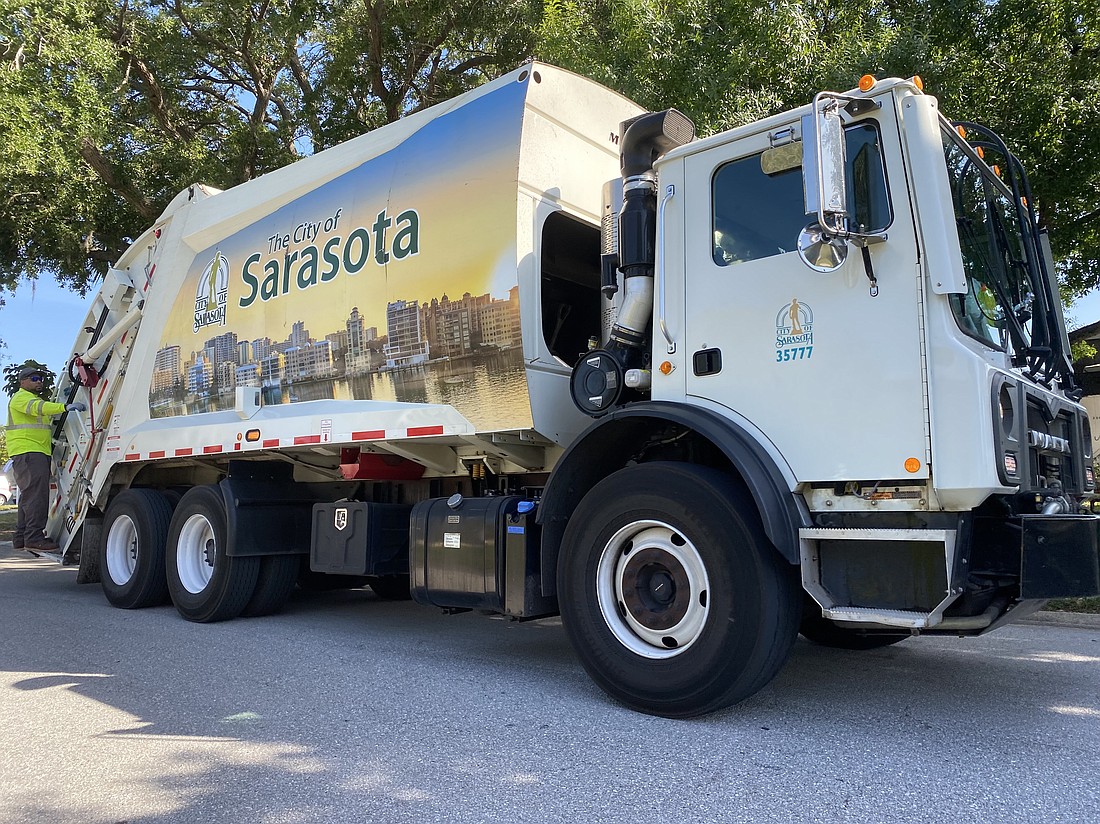- May 16, 2024
-
-
Loading

Loading

The theme for this year’s city budget season is covering costs in the areas of enterprise funds, services for which the costs are, in theory if not in practice, covered by the service users and not spread across the tax base.
Before the City Commission during its Sept. 5 meeting were rate increases for solid waste collection and connections to the city’s water and sewer systems, both proposed to fill the gaps between revenues and expenses. Both were approved by 4-1 votes with Commissioner Erik Arroyo dissenting both times.
Commissioners approved on second reading an increase to the fees for collecting residential and commercial solid waste and recycling.
Just as he did on first reading on Aug. 21, Arroyo was opposed.
“We are already more expensive than the county. There has to be a better way of addressing this,” Arroyo said. "Just two years ago we had an emergency situation and we were buying iPads and a bunch of other things that at the time I did not feel were conducive to a department that was in such a dire need to address this. The solution is not always higher fees. Sometimes it can be done by finding opportunities elsewhere.
"I would in the future entertain the discussion of seeing where we are with the county if there are any synergies there for addressing this.”
Effective Oct. 1, solid waste fees for residential customers will increase by $4.42 per month, up from $24.55 to $28.97. The ordinance also includes an 18% hike across the various levels of service for commercial customers. In addition, rates for both residential and commercial customers will rise by 4% in fiscal year 2026.
During the Aug. 21 first reading, Public Works Director Doug Jeffcoat told commissioners the increases were necessary to cover expenses and to build a three-month reserve fund for the department. He added attempted negotiations with Waste Management, the contract hauler for Sarasota County, did not yield any potential savings.
“The cost associated with that contract was much higher than what we can do in-house,” Jeffcoat said in August. “If you look around, pretty much the only contractual arrangements with outside firms other than being done in-house is by counties. You look at Northport, Bradenton and Venice, they're all doing it in-house because of that reason.”
Sarasota city residents aren’t alone in facing higher solid waste collection fees. The East County Observer reported Manatee County residents’ rates will increase by 65% starting next fiscal year.
In calendar year 2022, the city installed 176 new water connections and eight new sewer connections, accounting for a deficit of $290,000 in cost versus fees. Those installations do not include connections to larger meters of 6 and 8 inches, for which the city charges actual cost.
During a July 10 budget workshop, the utilities department presented a master plan update to the commission, part of the presentation including a proposed new rate structure for new water, reclaimed water and sewer installations.
“And the discussion was that the current fees were not capturing the actual costs of that of the new installations,” said Tony Centurione, the city’s utilities general manager. “We've tracked the actual costs and they're significantly higher on average than the current charges.”
"Significantly higher" as in a loss to the city of an average of $1,575 for smaller installations and up to $3,695 for larger. Those costs include piping, labor, concrete and more. They do not include repairs to asphalt, if necessary, which can vary widely.
The proposed rate schedule is intended to be flexible, according to Utilities Finance Manager Mark Nicklaus.
“It is going to be published every fiscal year on our utilities web page,” Nicklaus said of the rate schedule. “It will be amended and be based on current pricing, current labor rates and current equipment costs. Charging for the actual costs for the specific needs of each individual installation is the plan.”
| Meter Size | Current Charge | Actual Cost | Difference |
|---|---|---|---|
| 5/8"-3/4" | $325 | $1,900 | -$1,575 |
| 1" | $420 | $2,070 | -$1,650 |
| 1 1/2" | $850 | $3,122 | -$2,272 |
| 2" | $1,360 | $3,204 | -$1,844 |
| 3" | $1,890 | $5,388 | -$3,498 |
| 4" | $2,500 | $6,195 | -$3,695 |
The priced charged by the city for wastewater connections is $700 against an actual average cost of $2,111, a deficit of $1,411.
Commissioner Jen Ahearn-Koch asked why the city had not been charging the actual cost for installing new services.
“I’ve been with the utility since 2005. We've been through the recession and we had the downturn. There was a period where we actually pulled back on impact fees for a number of years,” Nicklaus said. “We just were more focused on the master plan and funding it through the (utility) rates. But then as we looked at it again, with inflation it was like well this is really severe and we have to address it now. The issue, too, is the customers that are six- to eight-inch are paying those actual costs. We just want to bring this to the smaller meters.”
Arroyo, who has been consistently opposed to rate hikes on city services throughout budget season, noted the utility fund balance had been steadily increasing yearly and asked why the installation rate increase was necessary and what the plans are for the additional revenue. The general utility reserve account at the end of fiscal year 2024 is projected at just more than $11.9 million.
“This is just capturing the expense of doing the work, so this is not creating any additional revenue,” said City Manager Marlon Brown. "Right now we're not capturing the actual cost, so we're using existing utility revenue to make up for what we should be charging. This is not a profit-type situation. What we put in is what we're getting back out. Nothing more, nothing less.”